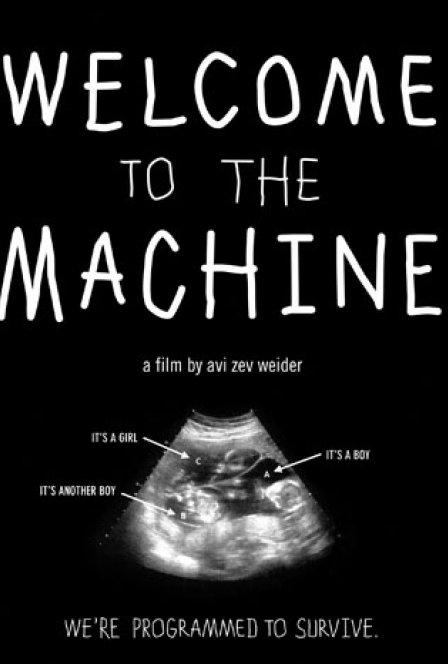Avi Zev Weider’s Welcome to the Machine is a clusterfuck of sentimental beliefs, opinions, and sometimes nonsense, professed by scientists, writers, and one Unabomber, who all have something to say regarding the question of technological ethics. From Ray Kurzweil to Ted Kaczynski, Weider focuses on a bunch of white men arguing whether or not “the machines” are going to take over and profoundly change the ways in which we animals do things. The impetus for this film project was the birth of Weider’s triplets, conceived as a result of in vitro fertilization (IVF). Home videos and photographs of Weider’s wife and triplets are sandwiched between guys talking about the future of computer science. Weider’s voiceover narration takes on a heavy hand as he confesses to viewing his children as “machines,” and with the rest of the film, seeks to explore the parallel between parenting and technology. Rather than create an interesting narrative on the effects of IVF and the fetus as parasitic, Weider goes down the geek road of ‘will the robots rule us?’ and offers a bland, messy, and ultimately misguided documentary.
I say “misguided” because the foundation of Weider’s question, “What is technology doing to us?” is flawed in that there is an inseparability between us and the machine. Our selves have become tiny, rapidly producing machines; technology is our identity. There is no way to turn ourselves off — well, other than, as David Foster Wallace put it in Infinite Jest, “erasing one’s map.” The infinite loop of identity building, or, if you will, ‘selving’ has become the ultimate machine. Former Wired magazine editor Kevin Kelly says in the film that the Big Bang was the first act of technology, suggesting that there is no a priori when it comes to technology’s existence in the universe. That’s something to consider, although one could also say that social networking is another kind of Big Bang of technological advancement. Weider does briefly consider the point that we are technology manifested when contemplating his prematurely-born children as demanding machines. Additionally, he interviews Rodney Brooks, professor of Robotics at M.I.T., who says, “I see my children and family as machines from one intellectual point of view, but I treat each one of them differently. I have two levels of interaction.” This perspective doesn’t necessarily make us any less human, as to be human means to feed, to fuck, to sleep, to learn, to die, to birth, to terrify, to turn on and off. To function. Unfortunately, Weider’s tone takes on parental guilt and terror at the idea that his offspring are mere mechanisms, turning that portion of the film into dramatic mush.
All of this goes to shit once Weider lets the opinions of David Skrbina and Ted Kaczynski take over the narrative. Skrbina, a lecturer in Philosophy at the University of Michigan, writes letters to Kaczynski in jail, and they collaborated on the book Technological Slavery. Despite this correspondence, Kaczynski, upon hearing news from Skrbina that Weider is making this film, goes so far as to write letters to Weider in which he tells Weider not to listen to Skrbina, that Skrbina does not understand any of Kaczynski’s ideas. Thus, it turns into a ‘who is more brilliant/insane’ pissing contest between two dudes with bad skin and radical ideas. Skrbina talks about the hierarchy of technology, where those in power benefit from its advances, and admits to not allowing cell phones or computers in his household. All of this coming from someone who teaches at one of the most respected universities in the country, and who acts as the Unabomber’s penpal. OK. I’d bet $300,000 that if Kaczynski had access, he’d have a Facebook profile page and he’d probably be jerking it to Chatroulette on particularly lonely Saturday nights. Small acts of destruction can be one’s own technology.
It’s easy and obvious to turn this into a patriarchal issue, which I won’t do, but I will say that Weider’s film could have done a helluva lot more if he’d simply sat down and interviewed his wife. Perhaps the reason (mostly) men seem to preoccupy themselves with this question of technological ethics is because they have no idea what it’s like to give birth. When I was pregnant, any notions of ‘life as sacred’ or of fearing the machine that is in all of us went completely out the window. The only food I could keep down was liquid-based, and my breasts seemed to double in size over night. I became the host. I realized my machine. For months, I lived in service to another being. Then, a machine was inserted inside of me, I saw the parasite inside of me, and the parasite was removed. I became a different machine after that. This is what it means to be fertile, to give birth, to reproduce, to deliver code into the world, to annihilate. Women have this knowledge; men do not. If Weider’s wife could speak, she might silence the back and forth of right vs. wrong, power vs. powerless, and say: technology is within us, it simply is.

